
Beyond a few photographs and feint recollections, my parents said little about their past, their energies focused (and sapped) by their concern to survive in their day. And so, they practised forgetting. Perhaps it is why I feel the need today, to search out the memories of my past, that of my parents, their parents and the ancestors who crossed the ocean to the land of my birth, a century and a half ago.
For long my energy too, was focussed on the issue of the day, the struggle for liberation from race and colonial rule in South Africa. For long, I subscribed to the view that the past was redundant, and that our future was constructed in actions in the present. Our time was for change not interpretation.
And then the catastrophe, COVID, hit and with it, the certainties of life were challenged. In our lockdown, in both body and mind, the future appeared uncertain and the present so fragile. It was in this time that questions, which I cast aside as irrelevant, redundant, resurfaced.
The need for interpretation, for meaning, grew strong. Who are my ancestors? What led them to cross the dark waters of the mad ocean? What were they thinking when they chose not to return to family, village, tradition? To rupture a continuity across endless centuries. And how is this me? Who am I in all this?
Ah, this was the time for memoir.
But how do I start? Where? What am I looking for? Our history is well documented. Facts and figures, dates places, events, names, village origin, and even caste. The details of close to a million coolies transported to plantations in British colonies in Southern African and the Caribbean, is recorded in spread sheets stored in colonial archives, available on the internet. All that a memoirist needs to begin writing.
Yes, but no.
Why no? These are verified historical facts.
Yes, but no.
No but what, why?
Because I want to hear their voices. My aya, my thata. Their fears, anxieties, sadness, the tears, the trembling heart, even their laughter as they were tossed around on the mad ocean, the terror of the dark waters. I want to witness the night of despair when they turned to the dance of Shakti, a celebration of their death. I want to be present with them on the morning of their rebirth, when in their hearts, they concluded that the past of suffering had passed and all that was present was a future, even though uncertain. I want to know how they constructed hope in a present so dark. And in them, I want to know about me. How am I them? How are they me?
But this knowledge is not possible. Only that which is factual is known.
Anything else is mysticism, perhaps nostalgia, angst and anxiety.
Yes, it is. But no, it’s not.
Perhaps it is about hope, not possible in the known only available if we search the unknown.
I slept with a mind raging in its own conflict. My dreams tossed around as if on the same mad ocean, in dark waters, sinking, rising. Then, at first light, when the azaan announced a fresh morning, I awoke. My heart expanded, new energy surging, an expectation, excitement. Something in the unknown was about to happen.
I flipped the lid of my laptop, pressed the start button. Google. The night had given me key words, images – Madras Mid-1800. Indentured labourer. Coolies.
Images flooded my screen, a selection that bypassed Google’s algorithms. And then she appeared, the picture of the woman wearing a sari.
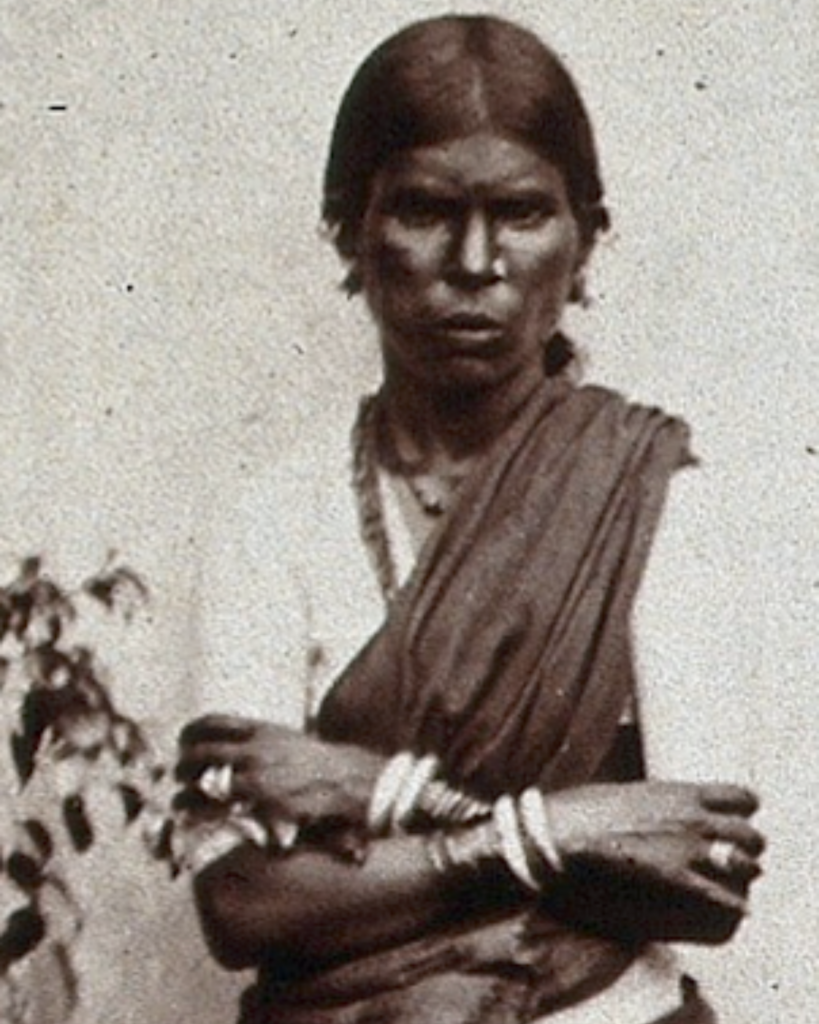
Her arms folded as if to protect herself, her eyes deep, intense, a face so rich in its darkness. Her gaze strong, focussed. A connection grows. The light from the computer screen fills my early morning room, we are in the same place, the same time. I am jolted with the intimacy of her presence. I hesitate, I am confused, I want to leave. Then I hear a voice, so quiet, so gentle.
Stay, stay, kanna, just a moment longer
She touches my hand, something so familiar, the bangles on her wrist, the necklace of beads, the rings on her fingers, the prayer beads around her neck, her hair combed back, her sari, the mundani thrown over her left shoulder, the dark piercing eyes.
She could be Ma’s mother. I say. The strength that emanates from her look, the quiet, the gentleness in her voice, the care in her touch. Just like Ma. I place a picture of Ma, one I took in 1980, next to the woman in the sari.
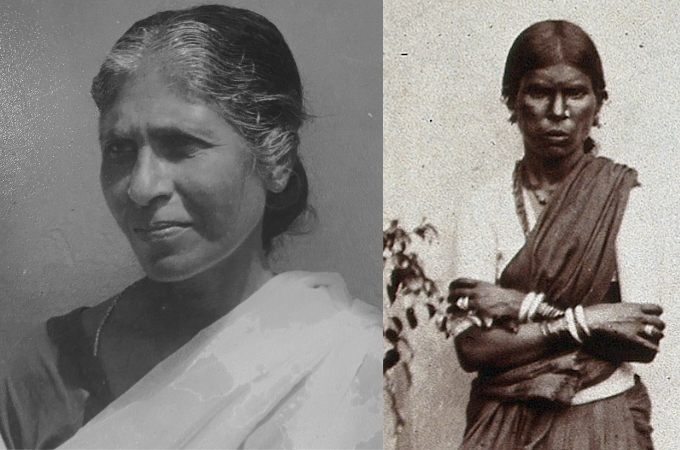
Ma was born in 1922. The picture of the woman in the sari is dated 1876-78. This would be about three generations back from Ma. Is it possible that the woman in the sari is Ma’s great grandmother?
Yes.
How do you know.
I’m sure, because it comes to me.
But how so
Just so.
Her name is Luxmi. I say.
How do you get to this. You are making it up.
Yes, because Ma’s name is Lutchmee.
In that moment the retort of doubt is doused. I hear Luxmi’s voice deep within me, in my thoughts, my words. Her story, my story, begins to write itself.
***
On the morning the picture was taken, Luxmi was up early, as she did every day of her life. The first light of the morning streaked through the crack in the door. Her daughter was fast asleep curled in the corner of the room on a grass mat. She spent a moment beneath the god lamp, a little shrine to the god Murugan that she set up on a little wooden box in the corner of the room. She marked her forehead with ash from the incense. She put out a little pot of ragu porridge with vegetables, which she cooked the night before. This would be Muniama’s meal for the day till she returned in the evening. She straightens out her sari she slept and woke up in, combed back her hair with a broken brush and stepped out, casting her eye over her sleeping child.
On her way out of the little settlement, she stopped by her immediate neighbour,
Aya she is still asleep; I am going now.
Poytiva kanna. Not to worry I will go to her now.
Her daily routine started with cleaning toilets in the nearby market, a job reserved for people of her caste, the pariyars. She was grateful for this work when she got it. She was paid just an anna sufficient to buy ragu for the family’s daily porridge. She supplemented this with vegetables she would get as payment for casual work she was given. When this was not available, she scavenged the market dumps with its heap of discarded vegetables, bones of chicken and goat, and other throw aways.
When I got to the market that morning, the kind Muslim man who gave me work the past week, he was not there. The people said that the man went away. He’s gone forever. He’s expired. I did not say a word, so many people were going away forever, never to return.
In her story to me, Luxmi went deeper into her past.
Every day, there was loss in our lives, since Allan left the camp where we worked, ten miles out of our village. This was the Ten Mile Rule of the British officials. They said, No rations would be given to people unless they worked ten miles from the village where they lived. So, we were forced to leave our parents, the sick, the old, in our village and walk ten miles away. We found work on a railway construction camp outside the ten-mile line.
After a few months in the camp, Allan was afraid that even though we received regular rations of millet and dal, sometimes dry fish, our family would not survive. There was sickness all around us and he was worried for our baby, Muniama, that she would fall sick. He left one morning to find that place where he heard that there was work in the market where the British soldiers lived. He heard that there was more food in the market dump than we received as rations in the railway construction camp.
Once I find work, I will return for you and Muniama
Poytiva, I said, Muniama and I will wait your return.
We waited but Allan did not return. Ever.
***
Aya, tell me how you came to be in the picture. I showed her a copy I found on the internet. She continued her story.
It was in the afternoon. I left the market area and walked to a clump of trees. I wanted to rest for a while before walking around the city dumps. I was tired and thirsty. Maybe I will find something. I saw a crowd of people. They were watching an English man. He was dressed in khaki shirt and pants. The brass buttons of his shirt were open. He was sweating a lot. He was very hot, he had a white cloth which he used to constantly wipe his forehead. The heat bothered him, he stood next to a box covered with a black cloth. The people told me that he was soldier. I knew there were many soldiers in the city, they had a big camp nearby. I too stood in the crowd watching to see what would happen.
The soldier was talking to his Indian assistant who was helping him arrange a few men and boys against a white wall. The people said that he was going to shoot them with his black box. The boys could not stand, they kept falling. The crowd of people watched this as if it was a show. They laughed looking at the face of the soldier and his frustration when the boys fell. The boys were so sick, they were just skin and bones. The people urged the boys to stand. The people shouted,
Stand, stand, if you stand long enough the sahib will give you food.
But they could not stand. The soldier was getting frustrated. I saw the black box pointing at the men. It was on three legs. The soldier was shouting now. But the boys could not hear him. It’s as if their life was no longer in their bodies. Their eyes were sinking in their heads, their hands hung on their sides too heavy to lift. Their clothes hung on their bones like dirty rags on a tree. I felt very sad. I saw this before, in the railway camp, men and women and children, skin and bones. At the camp Allen’s job, because he was a pariyar, was to carry their bodies to the pyres next to the river. When he returned, he smelt of smoke fire and the death incense from the pyre. I remember Allen’s words the day he left the camp
We suffer in life because we are pariyar, but I want our daughter to grow up breathing fresh air, not the smells of death.
He left. He did not return. But the death follows us wherever we go.
I looked into Luxmi’s eyes, and witnessed the sadness, a sadness that would travel with Muniama, across the dark and mad ocean, to reside in her daughter, my grandmother, and through my mother, to me. But there was joy in the hands that touched me. She pulled my cheeks and urged me to laugh.
I am so happy, kanna, that we connected. Don’t be sad about your past, we, the ancestors, bring love and happiness as well.
She returned to her story.
The soldier’s voice was loud in spite of the chatter of the crowd.
Get them to hold each other, that would prevent them from collapsing. And sit the ones who can’t stand on the ground in front of them.
No this will not do. I’ve taken this same picture too many times. I need something different. I need a contrast.
Darn this heat, I don’t know how these people live here.
As he wiped the sweat pouring down his forehead, I saw him turn his gaze towards to me.
Yes, that one
She is perfect, I want her.
That one there, he pointed me out, the little one, the woman in the sari, bring her.
The assistant came into the crowd and picked me out. I was afraid, I pulled back, I tried to hide in the crowd, but he followed me.
No, no I am frightened, what will the man do to me with that black box.
He won’t do anything,
Go, go.
Don’t go, he will shoot you.
Aka, it’s okay, go, he does not want your body. He only wants your spirit.
Yes, he will pack it in his black box and take it across the ocean.
He will make a present to the big Maharanee of England.
Then the crowd laughed and began to sing
You will go to London to see the Queen.
There were all these voices urging me on, pushing me forward, pulling me back. They were laughing. They were having a good time. The soldier saw me resist.
Offer a few annas, even a rupee. These people will do anything for a few coins. My time is running out, I must get back to camp.
Take it, aka. Ask for two rupees.
Yes, take it, what use is your spirit if your body dies.
The crowd was eager that I join the boys. They too were growing impatient to see how the black box worked. They pushed me forward.
So, that is how it happened. How I was in the picture.
I was angry. How could he take your picture, Aya. He had no right to do so. He had no right to force you to stand in the picture. Luxmi laughed.
But kanna, the pariyar had no rights ever. They were available to be taken by anyone, so also the English. But don’t be angry. Look at it this way, if the soldier did not take my picture, how would I travel across all this time to be with you? How then would you tell our story?
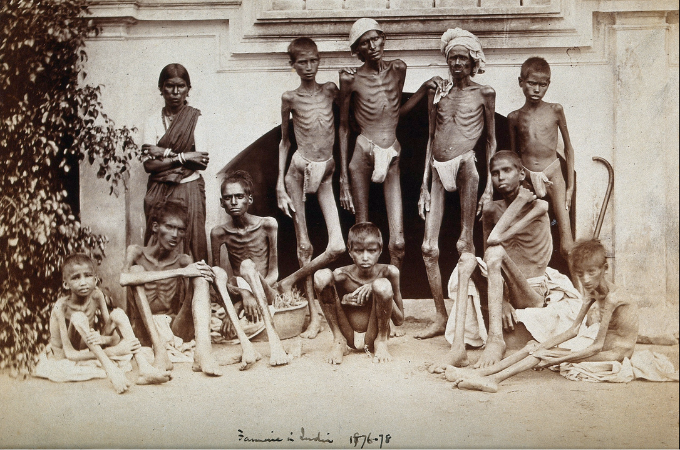
The picture was taken by a soldier in the British Army, Willoughby Wallace Hooper. He wrote a description: Famine in India: a group of emaciated young men wearing loin cloths and a woman wearing a sari. 1876/1878. The picture is archived to this day in the Wellcome Library Image Catalogue, USA.


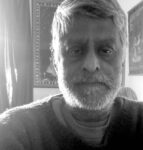




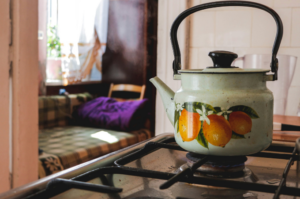


Juggie Pather February 24, 2025 01:49
Poignant, interesting, words and events become alive through the writer's pen